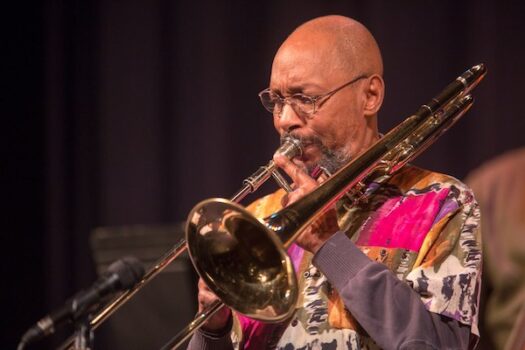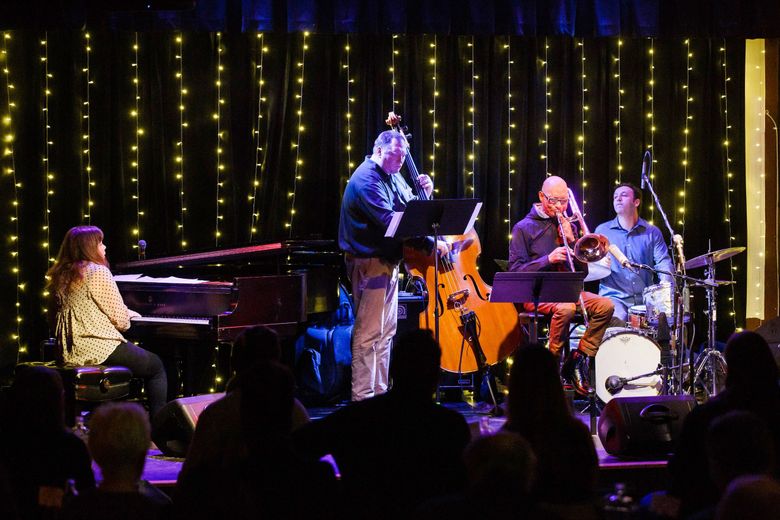Julian Priester sat in front of a small crowd at the brick-walled Vermillion bar on Capitol Hill on a recent Wednesday, holding a microphone in one hand and his 1977 record, “Polarization,” in the other.
“Let’s listen to it first, then talk about it,” he said, and the sound of two trombones joined in mournful melodies played from the speakers behind him.
Once the opening track of the album was over, he began to speak, stopping often to search for the perfect words. “You’re able to be more than you are,” he said, talking about playing music with a recording of yourself. “Eliminate the critic. You can do no wrong,” he offered, as a nugget of musical wisdom. And he reminisced on moments in the history of jazz — a genre he helped define as a trombonist for Dinah Washington, Sun Ra, Max Roach, Herbie Hancock, Duke Ellington and many others.
Since late October, the 86-year-old trombonist and retired longtime member of the Cornish College of the Arts music faculty has been hosting free listening and storytelling sessions at Vermillion each Wednesday at 5 p.m. (Shows from two of Seattle’s top jazz musicians begin at 7:30 p.m.) These events are the first live events produced by the Seattle Jazz Fellowship, an organization formed in the spring to support Seattle’s jazz community by putting on shows and fostering mentor-mentee relationships. After a distinguished career as a musician and educator, Priester’s focus now is teaching people the art of listening, the foundation of his musical philosophy.
When jazz trumpeter Thomas Marriott founded the fellowship this past spring, offering regular listening sessions was one of his top priorities.
“The idea was just to get people in a room to listen to records because that’s really how this music is learned,” he says.
Because Priester’s music is on “so much of the recorded history of the music,” Marriott says it was an obvious choice to ask him to lead the sessions and to be the fellowship’s artist-in-residence. One of the roles of the fellowship is to support jazz veterans like Priester: He shouldn’t have to hustle to get by at this point in his career, Marriott says. So the fellowship gave Priester a “signing fee” and now pays him weekly for the listening sessions and intends to do so for any other services (like gigs) he’d want to provide in the future. Marriott says the idea is to financially support any artistic project Priester wants to pursue. Eventually, Marriott hopes to offer listening sessions five or six days a week.
Priester got his start backing blues legends like Muddy Waters and Bo Diddley while in high school in Chicago. In the 1950s, he played in Sun Ra’s big band and with jazz legends like Lionel Hampton, Dinah Washington, Philly Joe Jones and Max Roach. He also released a couple of albums as a band leader.
During this time, Priester made a name for himself as one of the few trombonists who could keep up with Roach’s fast drumming while blowing over rapid chord changes with style. But even though he can play fast, Priester says he’s always preferred playing slowly — taking the time to listen to and improvise beautiful melodies that evoke emotion.
“I want to touch the person here,” Priester says, holding his hand to his heart. “I want to move them emotionally.”
Priester’s musical philosophy is evident in his improvisation, like in the intro to “Polarization.” The notes don’t feel imposed on the world. Instead, each sound responds to what was there before — making Priester’s improvisation so melodic you could believe it was composed. Marriott says this melodicism is fundamental to Priester’s sound.
Priester talks about how he wants people to recognize and respect the miracle of improvised jazz music, which he wants to rename “spontaneous composition,” a phrase he believes better captures the skill involved in soloing. But at the same time, he believes good music comes from humility.
Seattle jazz musician Steve Moore, who studied trombone with Priester for many years, says he learned “a reverence for sound and listening” from him.
Moore remembers Priester walking onto the stage at Cornish in front of a crowd and sitting, eyes closed, for five minutes. When he finally started playing, it was in tune to the buzzing of the stage lights — a sound most people would have ignored.
“Cultivating that sensitivity is something valuable Julian brings to music education,” Moore says.
Besides teaching the value of listening, Priester says he wants to advocate for the importance of music as a tool for emotional healing.
He lost his wife of 45 years, Jaymi “Nashira” Priester, in May, and he says though there’s a “big, empty spot” in his heart, music has helped him cope.
“It’s distracting for me. It fills up my head, my body, my heart, so that’s why I pick up the horn every day,” Priester says. “I don’t know what I would have done without music as a healer.”
The pandemic put a pause on Priester’s regular performances. And he’s working to release an album that got delayed because the production company went under — recorded with the same band as his 2002 album “In Deep End Dance”: Dawn Clement, piano; Byron Vannoy, drums; and Geoff Harper, bass.
But Priester is still practicing an hour or two every day, keeping his chops sharp for when he can perform again.
“I want to continue to give the gift of music to anyone who’s willing to listen,” he says.








More Stories
CD review: George Benson – Dreams Do Come True: When George Benson Meets Robert Farnon – 2024: Video, CD cover
The band was tight as ever. The Warren Haynes Band cuts loose: Video, Photos
Interview with Alvin Queen: Feeling Good – I heard these tunes played by … Video, new CD cover, Photos